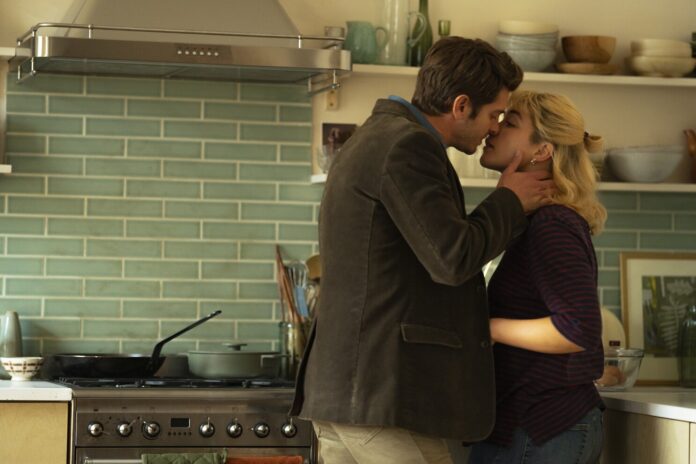We Live in Time isn’t a movie for everyone. Its non-linear narrative will frustrate some viewers as they have to mentally work to piece together the narratives from the different timelines, and because of its subject matter, some will feel it’s an overly saccharine tearjerker built in the vein of movies like A Walk to Remember. We Live in Time is a bit too generic in its design to stand the test of time, but the deeply moving performances from Florence Pugh and Andrew Garfield help elevate the material.
The film opens with Almut (Pugh) making eggs in the kitchen. She goes to wake her partner Tobias (Garfield), asking him to taste her food while he’s still in the throes of sleep. Everything seems happy and idyllic for Almut and Tobias, until it isn’t. Almut learns that her cancer has returned, and while she wants to be hopeful about beating it a second time, she senses that this might not be the case. She has so much to live for – she’s a talented chef still very much at the beginning of her career – not to mention she and Tobias have a young daughter together.
Pugh is the perfect choice to navigate the complex reality of a modern woman like Almut. Almut loves her daughter and sacrificed so much to have her, but she also wants to have a life that is beyond just being a mother. What goes into making a life – is it the people and relationships you build, or the ambitions and things you worked for? Almut and Tobias don’t always agree, but they learn to compromise, acknowledging that for a relationship to work you can’t always desire to get your way. Garfield offers a tremendous performance as Tobias, his emoting eyes constantly conveying Tobias’ interior and intentions.
The film’s non-linear narrative jumps between three timelines – the dating phase of Almut and Tobias’ relationship, Almut’s pregnancy, and the aftermath of Almut’s cancer diagnosis. I understand the intention – the movie wants us to live in time with these characters so we’re not always looking towards the end – yet it can be frustrating and a little jarring as the film sharply cuts to each different timeline. The transitions do become more seamless as the timelines start to converge, so it’s less of an issue as the film wears on.
Pugh and Garfield are heartbreakingly beautiful together, as they frame for us the beautiful life Almut and Tobias share. The film lingers on the ordinary moments: making eggs together, enjoying a chocolate orange in the bath, spending time with their daughter. The film’s lit in a way that feels naturalistic and grounded, as we move between Almut’s London apartment and the cosy family home; the frequent close-ups allow the performances from Pugh and Garfield to really shine. We lament the cruel twist of fate that’s brought us to this point, as the film builds to its inevitable conclusion.
Yet, it’s no coincidence that Almut and Tobias met right after his marriage ended. We’re reminded that wonderful things can spring from the grave of others. The movie is reminiscent of Mary Oliver’s poem “When Death Comes”, where the speaker boldly accepts the reality of death and embraces the joys of life. Time is finite and limited, and endings are painful, but the time in between is absolutely exquisite.
REVIEW SCORE: 4/5

